
views
"Are you okay?"

This is a simple way to begin if you aren’t sure what to say. Just saying those words shows the other person that you care. This response also works well if the person was a bit vague or you aren’t quite sure what’s going on with them. Hopefully, they'll elaborate and you can go from there. You could also say something like: "You sound really upset, Erica. Is everything all right?" "I can't believe that happened! How are you handling it?"
"I’m sorry to hear that."

Try this if the person shares some bad news. This works well when someone tells you that they’re going through something really hard. It helps to personalize the response a bit so it doesn’t feel too canned. For example: "Sherry, I’m so sorry to hear that Max died. He was a great dog." "I’m sorry to hear that you failed the test. I know how hard you studied." "I’m so sorry to hear about the breakup, Alex."
"That sounds really difficult."
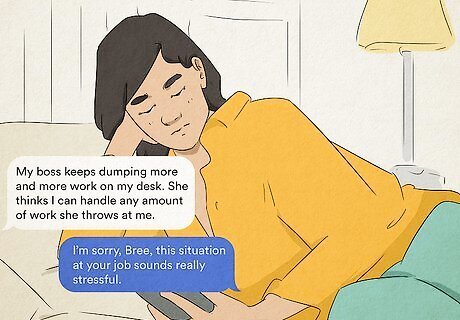
Validate their feelings to help them feel understood. This shows the person that you were listening. You’re acknowledging their pain or sadness as a valid response. You could also say: "Getting that kind of news must be so upsetting." "It sounds like you’ve been through a lot today." "I'm sorry, Bree, this situation at your job sounds really stressful."
"Do you want to talk about it?"
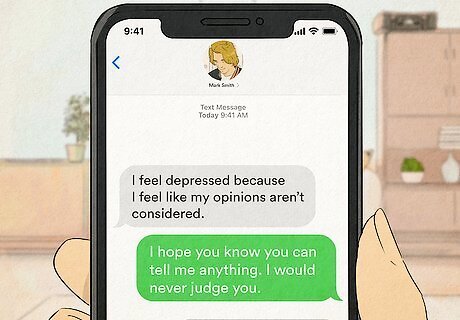
Let them know that you’re here to listen. If the person is being a bit vague, this can help draw them out. They’re more likely to open up if you show them you're ready and willing to listen. You could also say things like: "Can you tell me what happened at school today?" "I hope you know you can tell me anything. I would never judge you." "That must have really hurt. It might help to talk about it."
"I can’t imagine what this must be like."

Let their pain take center stage right now. Even if you can relate to their situation on some level, it’s really not the time to compare stories. Stay focused on them and what they’re going through. Give them space to vent and say whatever they need. You can also say: "You’re not alone. I may not understand exactly how you feel, but I care about you and I’m here for you." "That’s never happened to me before, but your feelings make total sense." Avoid saying things like, “I know exactly how you feel.” Your heart is in the right place, but inserting yourself into the conversation isn't a good approach. Give the person space to express themselves without comparing their situation to something you've gone through.
"Thank you for trusting me with this."
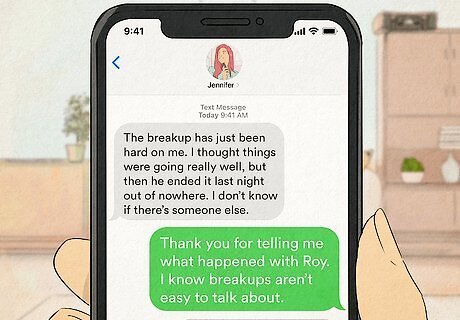
This works well if the person shared something really personal. It’s hard for people to open up and be vulnerable. It takes courage. It also says a lot about your character if someone trusts you enough to share something that personal. You could also say: "Thank you for telling me what happened with Erik. I know breakups aren't easy to talk about." "I appreciate that you shared something so private with me. Your secret is safe." "Don't worry, this conversation stays between you and me."
"What can I do to help?"

Put the ball in their court rather than offering unsolicited advice. It’s normal to want to offer solutions, but if the person didn't ask for your advice, don’t offer it. Instead, let them know that you’re here for them in any capacity they need. You can also offer to help with something specific that doesn't have anything to do with offering advice. Here are few good ways to approach this: "If you need anything at all, I’m here for you. Just say the word." "You're going through so much. Can I pick up any groceries or bring you a meal?" "I can pick up your homework and bring it over this afternoon. Would that be helpful?"
"Would you like some company?"
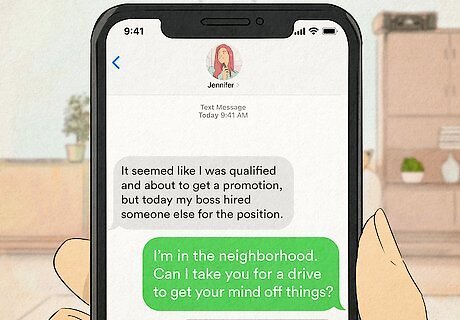
This is a low-key way to offer your support. Don’t push, just ask once. If they decline, they probably just need to be alone right now. That’s totally normal, so be sure to respect their feelings. You could also say: "I’m just a phone call away if you need me." "If you don’t want to be alone right now, I can come by." "I'm in the neighborhood. Can I take you for a drive to get your mind off things?" "Do you want to go for a walk? We don't even have to talk, I can just be there for you."
"This is tough, but you're stronger than you know."
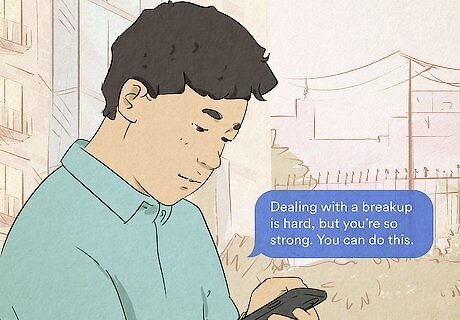
Remind them of their strength without minimizing their sadness. It's okay to encourage someone when they're down as long as you do it carefully. Avoid saying things that might belittle their feelings like, "This will pass. Hang in there," or "You're just going through a phase." Instead, acknowledge their strength and courage. For example: "Dealing with a breakup is hard, but you're so strong. You can do this." "Losing a pet is so sad. It's going to hurt for a while and that's okay. You will make it through this, I promise."
"I’m sorry to hear about your loss."
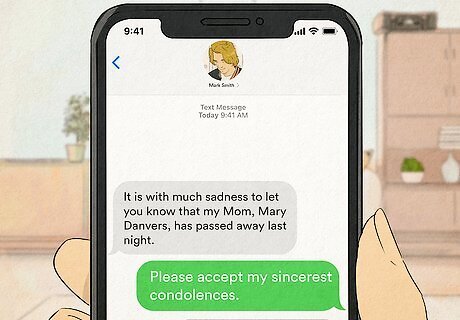
This works well if someone they know has passed away. It’s hard to know how to respond in this situation. There’s nothing you can really say or do to take away their pain, so just communicate how sorry you are. You can also say: "Please accept my sincerest condolences/sympathies." "My heart hurts for you. I’m so sorry." "I’m stunned to hear about Daniel's passing. I am so very sorry."
"Thinking of you. I’m here if you need me."
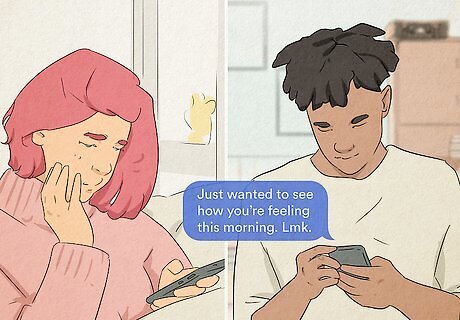
Check in with them a few hours later (or the next day). Following up with them via text only takes a few moments and it will mean a lot to the person. Give them a little space and then shoot them a text to check in. You might say: "Just wanted to see how you’re feeling this morning. Lmk." "Are you feeling any better today? I hope so."




















Comments
0 comment